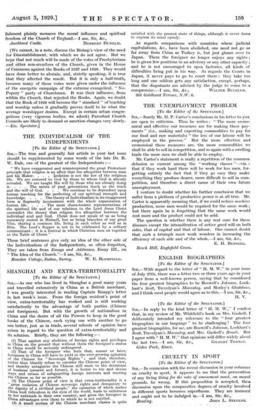THE UNEMPLOYMENT PROBLEM
[To the Editor of the SPECTATOR.] SIR,—Surely Mr. H. P. Carter's conclusions in his letter to you are open to criticism. Thus he writes : " The more econo- mical and effective our measures are for making these pay- ments " (i.e., making and exporting commodities to pay for our food and raw materials) " the less of our labour will be employed in the process." But the more effective and economical these measures are, the more commodities we shall be able to sell in competition, and so again with a swelling trade the more men we shall be able to employ.
Mr. Carter's statement is really a repetition of the common delusion so current among the " working classes "—viz. : that if they work hard there will be work for less men, for- getting entirely the fact that if they go easy they make everything they produce dearer, more difficult to sell in com- petition, and therefore a. direct cause of their own future unemployment.
I venture to doubt whether his further conclusion that we suffer from a plethora of productive power is at all true. Mr. Carter is apparently meaning that, if we could reduce machine production, more men would be required for the same work ; but there again he is forgetting that the same work would cost more and the product could not be sold.
The question is whether there is any real cure for these diseases except the intensification of active good will on both sides, that of capital and that of labour. One cannot doubt that such a triumph must work wonders in increasing the efficiency of each side and of the whole.—I am, Sir, &c.,


































 Previous page
Previous page